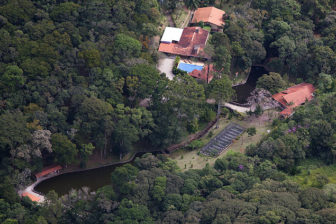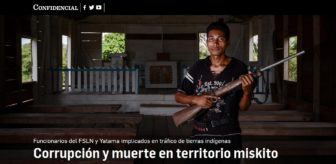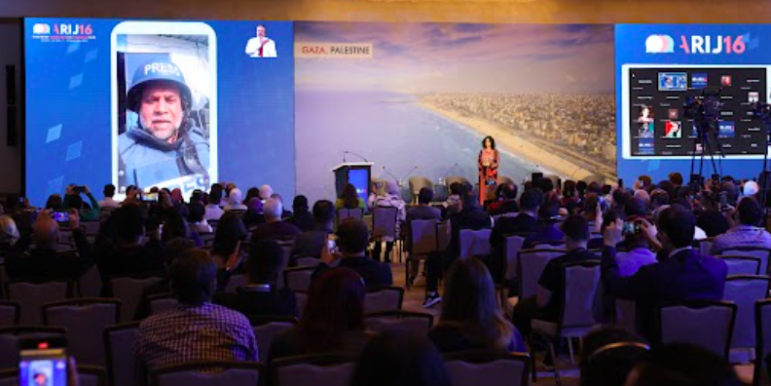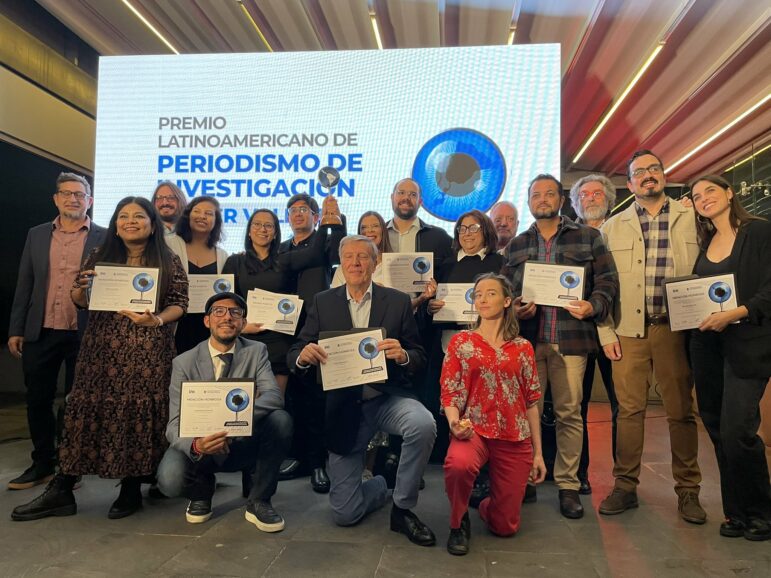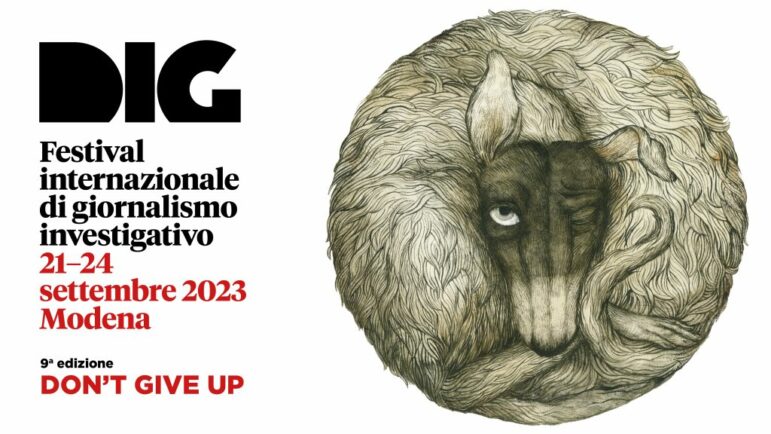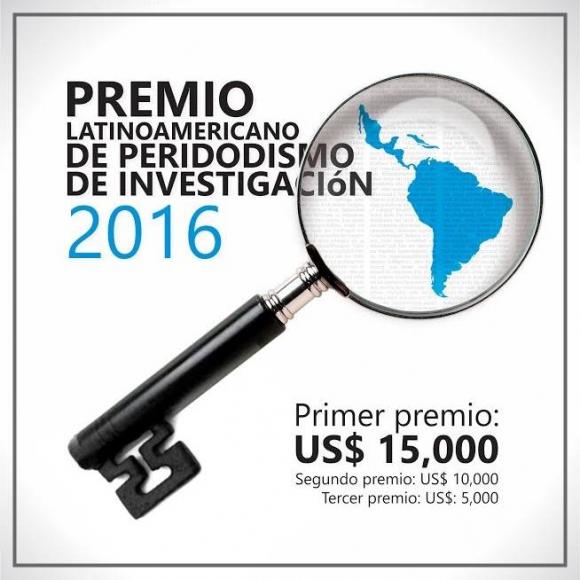

Human Rights Stories Shine at COLPIN Awards
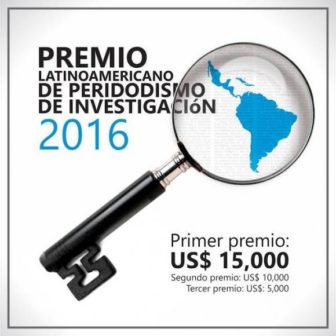 Investigations into extrajudicial killings, violent conflicts over land and timber, and trafficking of cultural heritage items took home the top three prizes at the 14th Latin American Investigative Journalism Awards (#COLPIN2016), held in Panama last weekend.
Investigations into extrajudicial killings, violent conflicts over land and timber, and trafficking of cultural heritage items took home the top three prizes at the 14th Latin American Investigative Journalism Awards (#COLPIN2016), held in Panama last weekend.
A total of 33 works were semi-finalists from among 266 submissions for printed media, radio, television, and digital platforms. From those, the jury granted honorary mentions to ten entries and awarded three winners based on their outstanding quality. The jury, which composed of Santiago O’ Donnell (Argentina), Fernando Rodrigues (Brasil), Giannina Segnini (Costa Rica), Lise Olsen (USA), and Ewald Scharfenberg (Venezuela), met in Panama City for two days to evaluate and select the best works. The award is jointly organized by Transparency International and Peru’s Institute for Press and Society (Instituto Prensa y Sociedad, or IPYS) to encourage greater transparency in government, business, and media.
Quality of Winning Entries
The jury made a special mention regarding the outstanding quality journalistic work on human rights violations, specifically on killings and extrajudicial executions, which would have remained unpunished without the work of investigative journalists in Mexico, Peru, Brazil, and El Salvador. 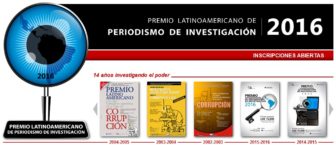 The jury also highlighted the existence of networking, collaborative, and transnational work methodologies streaming from data journalism, as demonstrated by Wikileaks, Swissleaks, and the Panama Papers. In this contest, this was reflected by investigative collaborative work among journalists and institutions from Peru, Ecuador, Mexico, Venezuela, Nicaragua, and United States. Regarding corruption, this year’s focus centered on investigations that uncovered a direct and tangible relationship between missing or misused state money and the fate of vulnerable citizens. Examples included traffic accident victims in Colombia and cancer patients in Venezuela.
The jury also highlighted the existence of networking, collaborative, and transnational work methodologies streaming from data journalism, as demonstrated by Wikileaks, Swissleaks, and the Panama Papers. In this contest, this was reflected by investigative collaborative work among journalists and institutions from Peru, Ecuador, Mexico, Venezuela, Nicaragua, and United States. Regarding corruption, this year’s focus centered on investigations that uncovered a direct and tangible relationship between missing or misused state money and the fate of vulnerable citizens. Examples included traffic accident victims in Colombia and cancer patients in Venezuela.
The Winners
First Prize (US$15,000)
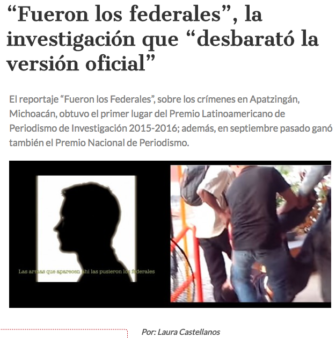 “Fueron los Federales” (It Was the Feds) by Laura Castellanos (Mexico), about the Apatzingán crimes. Castellanos’ investigation disproved the official version regarding the deaths of 16 people allegedly caught in a “cross-fire” shooting incident in Apatzingán, Michoacán, back in January 2015. The investigation concluded that police agents, supported by the military, extrajudicially executed unarmed citizens. The report was released by the news portal Aristegui Noticias and the magazine Proceso, and reflects the journalist’s independent, systematic, and — in some cases — solitary efforts to investigate and uncover crimes against humanity committed by state security forces. The newspaper El Universal, for which Castellanos worked as a freelancer, refused to publish the report. She was relentless in her search and collection of testimonies in a high risk area, and fought to ensure that the story went public, despite attempts of censorship.
“Fueron los Federales” (It Was the Feds) by Laura Castellanos (Mexico), about the Apatzingán crimes. Castellanos’ investigation disproved the official version regarding the deaths of 16 people allegedly caught in a “cross-fire” shooting incident in Apatzingán, Michoacán, back in January 2015. The investigation concluded that police agents, supported by the military, extrajudicially executed unarmed citizens. The report was released by the news portal Aristegui Noticias and the magazine Proceso, and reflects the journalist’s independent, systematic, and — in some cases — solitary efforts to investigate and uncover crimes against humanity committed by state security forces. The newspaper El Universal, for which Castellanos worked as a freelancer, refused to publish the report. She was relentless in her search and collection of testimonies in a high risk area, and fought to ensure that the story went public, despite attempts of censorship.
Second Prize (US$10,000)
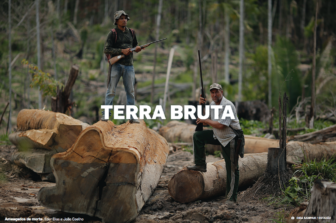 “Terra Bruta” (Savage Land) submitted by André Borges, Leonencio Nossa, Dida Sampaio, Helvio Romero, Luciana Garbin, Fábio Salles and Everton de Oliveira, from “O Estado de S. Paulo,” Brazil. After seven months of investigation, this project uncovered a chain of criminal activities related to land and timber in the north and central-west areas of Brazil. The journey of this journalistic team into several states led to the exposure of how this trafficking helped finance political campaigns and generated disputes over land control which took the lives of hundreds.
“Terra Bruta” (Savage Land) submitted by André Borges, Leonencio Nossa, Dida Sampaio, Helvio Romero, Luciana Garbin, Fábio Salles and Everton de Oliveira, from “O Estado de S. Paulo,” Brazil. After seven months of investigation, this project uncovered a chain of criminal activities related to land and timber in the north and central-west areas of Brazil. The journey of this journalistic team into several states led to the exposure of how this trafficking helped finance political campaigns and generated disputes over land control which took the lives of hundreds.
Third Prize (US$5,000 )
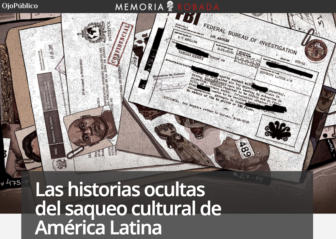 “Memoria Robada,” a transnational investigation conceived and coordinated by David Hidalgo. The team included Fabiola Torres and José Luis Huacles (Ojo Público, Peru), Hassel Fallas and Lorenzo Pirovano (La Nación, Costa Rica), Julie López (Plaza Pública, Guatemala), Catalina Oquendo (Chequeado, Argentina), and Tania Montalvo and Arturo Daen (Animal Político, Mexico). After a year-long investigation, this team project exposed the participation of organized crime networks in cases of trafficking antiquities and other cultural heritage items in Latin America.
“Memoria Robada,” a transnational investigation conceived and coordinated by David Hidalgo. The team included Fabiola Torres and José Luis Huacles (Ojo Público, Peru), Hassel Fallas and Lorenzo Pirovano (La Nación, Costa Rica), Julie López (Plaza Pública, Guatemala), Catalina Oquendo (Chequeado, Argentina), and Tania Montalvo and Arturo Daen (Animal Político, Mexico). After a year-long investigation, this team project exposed the participation of organized crime networks in cases of trafficking antiquities and other cultural heritage items in Latin America.
Honorary Mentions
Argentina
- “Cristobal López, the Businessman Who Built an Empire (with his unpaid taxes)“, by Hugo Alconada, La Nación.
- “The Convent of Suffering“, by Daniel Enz, Análisis Magazine, Paraná, Entre Ríos.
- “The Company Odebrecht Paid For Works in A Property Used by Lula“, by Flavio Machado, de Folha de S.Paulo.
Chile
- “Alba Has Eight Offshore Accounts in Panama So As To Reduce Taxes in El Salvador“, by Efren Lemus, El Faro.
United States
- “Ortega is Reportedly Having A Relationship With A Minor“, by Judith Flores, Diario Las Américas.
- “Corruption and Death in Miskito Territory“, by Wilfredo Miranda, Confidencial magazine.
Mexico
- “The Cartel that Financed Enrique Peña Nieto“, by Raúl Olmos and Valeria Nohemí Durán.
Peru
- “Extrajudicial Executions“, by Carlos Castro, Segundo Serrato Sánchez, Ana Veliz Vásquez, Agustín Chávez Hernández, Verónika Reyes Tolentino, Anuska Buenal and René Gastelumendi, program Cuarto Poder, América Televisión.





